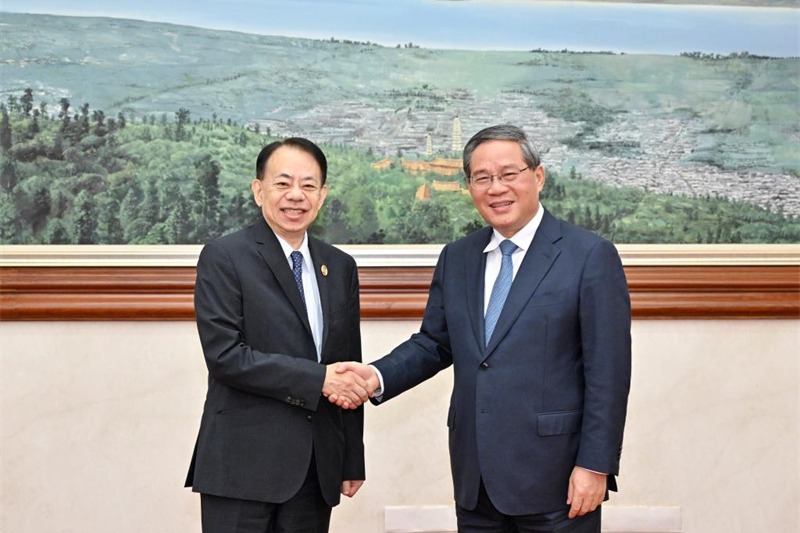Strong efforts to further open financial sector 'beyond expectations'


China has accelerated the opening-up of its financial sector by launching a series of policies and measures last year, said financial practitioners and experts.
Nomura Holdings Inc's majority-owned securities joint venture in China, Nomura Orient International Securities Co Ltd, opened for business in Shanghai on Dec 20. It became the first newly formed securities joint venture, in which the foreign side holds a controlling interest, that has opened for business in China.
Nomura owns 51 percent of the outstanding shares of the joint venture, whose registered capital is 2 billion yuan ($287 million), Orient International (Holding) Co Ltd 24.9 percent, and Shanghai Huangpu Investment Holding (Group) Co Ltd 24.1 percent.
"It was beyond market expectations that China made strong efforts to push further opening-up in the financial sector last year, bringing a number of business opportunities for foreign institutions," said Tang Shengbo, head of China financials research at Nomura.
The country will lift foreign ownership limits on securities, fund management and futures companies by 2020, a year ahead of schedule, said the State Council's Office of Financial Stability and Development Committee on July 20 when it announced 11 measures to further expand the financial sector's opening-up.
Encouraged by policies, foreign shareholders of a joint venture in China may hope to take a controlling interest in the company or even hold 100 percent of its shares. Besides, some foreign financial institutions, which either withdrew from joint ventures they previously formed with Chinese partners or have not yet conducted business in the country, may apply for new business licenses or re-enter the Chinese market through mergers and acquisitions, analysts said.
"Foreign investors are now willing to invest in China's financial market, and the country is removing regulatory barriers to foreign investment. As the financial market is comprehensively opening up in many sectors including insurance, asset management and mutual funds, there is a lot to do for foreign investors in different business segments," Tang said.
Tang noted that foreign insurers holding a controlling ownership interest in joint ventures in China can set up asset management companies later, just like their Chinese counterparts.
"Recently, regulators have kept highlighting the principle of equal treatment for foreign and domestic investment. Many foreign-invested companies will think of ways to take the opportunity," he said.
"Policymakers and regulators need to make detailed rules for the implementation of these policies. They may even allow some existing regulatory frameworks of Chinese investment to be applied to foreign investment," Tang added.
China's accelerated opening-up of its financial sector since April 2018 will also bring development opportunities for the country's commercial real estate market, said Cushman& Wakefield, a global real estate services firm, in a report issued on Dec 18.
"As overseas financial institutions keep coming to China, they will bring business opportunities to the office market in first-tier cities and certain core second-tier cities. Meanwhile, overseas insurers will enter the Chinese market continuously and will hopefully give strong support to the bulk properties investment market," said Wei Dong, head of North China research at Cushman& Wakefield.
CG Lai, CEO of BNP Paribas (China) Ltd, said: "The year 2019 marked a set of milestones for China's further reform and opening-up of its financial sector, sending a strong signal of the country's determination to uphold an even more open economy, laying solid groundwork for further market liberalization and injecting confidence into all foreign financial institutions in the Chinese market.
"We believe that the policies toward liberalization are enabling foreign subsidiaries and branches in China to be more connected with their international franchise network, easing the procedures to leverage resources from parent companies, which ultimately address the growing and robust demands from both foreign and domestic clients."
BNP Paribas is one of the first two foreign banks that have received a Type A Corporate Bond Lead Underwriting License from the National Association of Financial Market Institutional Investors after China announced 11 measures in July to promote the further opening-up of the financial sector, allowing foreign banks to apply for such licenses.
"For all foreign financial institutions in China, the world's second-largest credit market is definitely appealing and will inspire a wider array of cooperative models and tailored products among domestic and local players," Lai said.
"Alongside a deepened engagement of foreign institutions in China over the past few years, market governance will be enhanced, driven by the participation of all, and we are confident it will reach new heights through an even more open financial environment in the near term," he said.
Further opening-up of China's financial sector will particularly benefit foreign asset managers, life insurers and securities brokerages, for some of the skills they have in these niche markets are not yet mastered by their Chinese counterparts, said Nicholas Zhu, vice-president and senior credit officer at Moody's Investors Service.
US-based asset manager Vanguard and Ant Financial Services Group announced on Dec 14 they had established a joint venture to provide a fund investment advisory service to Chinese individual investors, as approved by the China Securities Regulatory Commission. Ant Financial holds a 51 percent stake in the joint venture whose registered capital is 20 million yuan, and Vanguard holds 49 percent.
Back in 2017, Vanguard launched its wholly foreign-owned enterprise in China-Vanguard Investment Management (Shanghai) Ltd-in Shanghai free trade zone.
Charles Lin, chief executive officer of Vanguard Asia and chairman of Vanguard Investment Management (Shanghai) Ltd, said: "China's new round of opening-up of its financial sector provides foreign asset managers a rare opportunity to enter the Chinese market. Following the launch of a series of policies, the country will make big progress in its asset management industry, which will help the industry to keep up with international standards and practice."
In the past, many domestic asset managers took distribution channels and sales capability as the core of the asset management business. They built their resources, experience and abilities mainly in terms of looking for credit assets and designing financial products that were nested in multiple layers. However, as far as Vanguard is concerned, investment and asset management capabilities lie at the core of asset management, Lin said.
"As foreign asset managers, we think the road map for China's opening-up of its financial sector is crystal clear, and we believe the Chinese market will open up continuously. This has further consolidated foreign institutions' long-term confidence in China and has also given us clearer directions," he said.
"We hope that our company and the Chinese market and financial system will learn from each other, become accustomed to each other, and grow together. Only by building a better financial market and business environment through multi-party efforts, could we provide higher quality services to investors more efficiently."
Vanguard is looking forward to bringing its experience and advantages in mutual fund product investment, research and development in the US and other developed countries to China, promoting practices to develop an enduring investment philosophy, and launching mutual fund products, which are suitable for long-term investment by individual and institutional clients, he said.




































